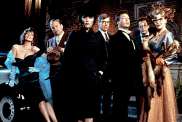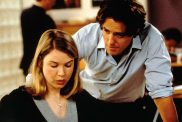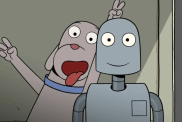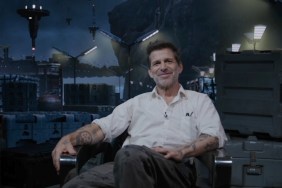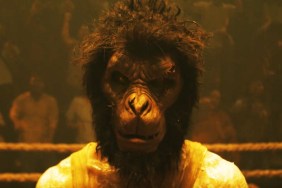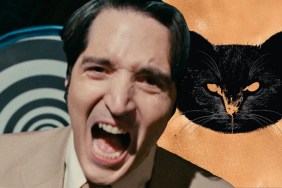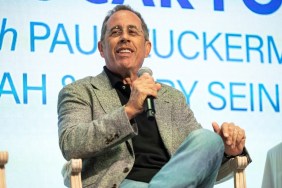
Interview with No Escape filmmakers John Erick and Drew Dowdle
While the Dowdles, John and Erick, are no strangers to ComingSoon.net’s horror site ShockTillYouDrop.com, having written, directed and produced a number of memorable recent horror films, including The Poughkeepsie Tapes, Devil, Quarantine and last year’s As Above, So Below, their latest film No Escape, starring Owen Wilson, Pierce Brosnan and Lake Bell, is more of an action-thriller, although it still retains some of the terrifying elements of their other movies.
Wilson and Bell play Jack and Annie Dwyer, the parents of two young girls who have come to Thailand on a business trip only to get caught up in a violent coup that sends hundreds of angry protesters to the streets to find and kill any foreigners. Realizing their lives are in danger, the Dwyer family have to escape insurmountable odds, which is a terrifying thought for anyone who has ever travelled to another part of the globe.
ComingSoon.net got on the phone with the Dowdles last week to talk about the logistics of making such a complicated and still fairly low-budget movie in Thailand.
ComingSoon.net: It’s somewhat rare that filmmakers in horror write a lot of their own movies (although “Devil” was an exception) so what got you interested in making a thriller that doesn’t have supernatural elements like your last few movies?
John Erick Dowdle: We’ve always loved doing very naturalistic (films), trying to capture a semblance of reality. In fact, our very first movie “The Poughkeepsie Tapes,” the thing that drew us to it was the idea of trying to make something that feels really, really real. Essentially, that became found footage and for this one, we really liked this idea of a family in this kind of situation and to see what a family would go through in a heightened environment like this. I think that’s really what drove us to this.
Drew Dowdle: I think even our horror films with more supernatural elements, we’ve always tried to keep them really grounded. “Devil” for example is a little more supernatural, but how do we shoot this and make this in a way that feels like it could happen or is happening. Obviously, our found footage movies have that kind of reality elements baked into the fabric of the movie, so I was drawn to that and this idea was not a horror film, but it was one where we felt that if the family feels real from a performance standpoint and the situation feels real, this can really work and could be a really fun ride. But it’s really gotta resonate on a realistic level.
CS: I feel like some of the things in this movie could really happen to a family on vacation or business trip, and we’ve heard stories about this happening? Was there any incident in the news that inspired this?
John: Actually, along those lines, my father and I went to Thailand. We were traveling in Southeast Asia and right before we got to Thailand in 2006, a coup overthrew the prime minister and a general took over the country. There was no warning about it. We were just in Thailand and they’re scanning under our cars for bombs as we approached the hotel and there’s this real heightened military presence everywhere we went. It was okay but it really got me thinking, ”Oh, what if you had kids on this trip and what if it wasn’t okay?” What if it was more like Phnom Penh in 1975 when they took over the city and made everyone leave, cleared out the entire city of Phnom Penh in a day. What if you were there during an event like that? Drew and I, we come from a big family, and as kids had travelled to Thailand with our two little sisters years before, so the little girls in the movie are based very much on our little sisters and some of our experiences from traveling in Thailand with them. As we were writing, right after we wrote our first draft, there was a really tragic attack of a hotel in Mumbai, India, where people came in, and they were trying to destroy the tourism of India by attacking a hotel and killing a bunch of people inside. There’s a number of true events that we looked to. We studied the security footage of that hotel incident and there’s moments of it where you see a gunman firing in the lobby of a hotel, there’s just something just primally disturbing like, “Wait, no, this is a safe place. The hotel, that’s home base. You’re not allowed to come in here!”
Drew: Yeah, to see an embassy destroyed is a primal, scary thing. John mentioned the Mumbai incident, but in early drafts of the script, we went to great lengths to establish the reality of an event like this. A government can be toppled and a rebel faction can take over a city like this. This is a realistic scenario. Over the course of the next year or two, there was Mumbai, but there’s also the entire Arab Spring event in Tunisia and Cairo where you’re seeing these entire countries being toppled overnight, one after the next. By the time, the Arab Spring had happened, we said, “Well, people know that these things happen now.” These are very topical news events now and we don’t need to convince people that this is possible. Let’s just tell the story.

CS: It is very realistic, but you kept some of the genre elements in creating tension and you have some gory violence, but it’s also very cinematic. You mentioned found footage which is something you did with your last movie (“As Above, So Below”), but “No Escape” is more cinematic, so can you talk about keeping realism without going the documentary approach?
John: At this point, it was nice. With found footage, one of the constraints with found footage, you always have to justify the camera and the position of the camera. It’s really pleasant on this and on “Devil” too, it’s so gratifying to say, “Okay, I can put a camera on the floor, I can put one up high. I can use a crane.” It’s such a relief to be able to just slow dolly in and those kinds of things. The cinematographer we used, we had worked with in Paris on “As Above, So Below” and we just loved his style and his can-do attitude and the images he gets. He’s so punk rock and he doesn’t feel beholden to the rules. Most DPs are like “No, no, wait an hour for the light” and there are moments where you’re like, “Okay, shoot that, please!” and the cinematographer’s like “No, no”… Leo Hinstin (the cinematographer), he was just down. He wasn’t scared when we said, “Okay, we want this to look beautiful but we don’t want to ever have to set marks for the girls. We want those kids to be able to move wherever they want to move and we will make sure they stay on camera.” And Leo had all kinds of really interesting ways to implement… I mean, he didn’t bring any crew from France. I mean a French DP with an all-Thai crew—that’s badass! One of the upsides of this movie taking so long to get made is that we had a lot of time to prepare. We storyboarded the whole movie. We really knew what we wanted to see in it and it was really fun to have a movie where we could get really cinematic and not be constrained by found footage or those kinds of constraints. It was a really nice challenge on this one.
Drew: Yeah, it was. It was really such an asset that we had storyboarded this movie five times over, but when we got there, and Leo was on hand, he really helped us to conceive some of those idea and this one shot that I have to talk about him was throwing Lucy off the roof onto the (other building). We actually rigged him up on wires and he was operating and threw her and he went up over the gap on wires himself and was shooting her close-up as he was flying through the air. He had ideas like that and we were like “Okay, we’ll try it,” and as John mentioned, we had three cameras running the entire show. We didn’t muck it up with setting marks all the time. We just said, “Look, you gotta trust us. We will not let a shot get through that doesn’t look great,” and he did, and not every DP will do that. We really selected him for that reason, because we needed to move quickly and we wanted to have really good photography and he was a beautiful shooter. He trusted us, and we trusted him and that allowed us to really cover a lot of ground.
CS: While you were writing this, you must have a lot of things you realized would be a challenge, like shooting in Thailand, getting extras from there and that scene you mentioned. Did you ever wonder how you were going to do it or did you just have that extra time to figure it out?
John: We try when writing to keep the “Well I don’t know how we’re going to do that but let’s put it in anyway.” A helicopter crash and throwing kids off (the roof), but then there’s all these other things you don’t even consider like how hard it is to find actors who you can convince that spending four months in Thailand is a good idea. There’s challenges like that, too, you don’t even see coming. I think part of the fun of the job is learning how to do things you don’t know how to do. We couldn’t afford a tank but the art department built a tank shell and we put it on a pickup truck and that was our tank. There’s things like that. In Thailand, they’re just not cool with driving tanks around in the street. But it’s like how can we find a way to make this feel real and feel right? That’s really part of the fun of the game for us.

CS: You mentioned the cast and it’s interesting that both Owen and Lake, while they both have done dramatic work, they’re better known for comedy and you cast them in roles where there’s no humor at all. Can you talk about casting them?
John: Yeah, from the start, we loved doing this–casting someone because you haven’t seen them do a whole bunch of movies like this, make it feel more real, more like one of your friends going through this. Owen is such a brilliant everyman and to see him struggling. You know he’s not a Navy Seal who is just going to bust out all these skills that we haven’t seen yet. It just feels right for him not to have all that stuff. If you see him doing a lot of these kinds of movies, you might feel like they’re hiding skills they have. We loved the idea of really casting this in a really interesting way and try to get a revelatory performance from someone is pretty awesome. Every day on set, I’ve never seen Owen do this and this scene, I’ve never seen Owen doing something like this. We had that feeling over and over. It was just so exciting to see that, and Pierce, too. We like to joke that we sort of cast Owen in Pierce’s role and Pierce in Owen’s role, where Pierce is the comic relief to some extent, and is so awesome and we liked him playing against what you know of Pierce.
Drew: And Lake Bell, we really felt like we hit the lottery with her. That was a tricky choice, not Lake but casting Annie was a tricky choice, because (we needed) someone tough enough where you felt like… it was almost a two-hander and she was also going above and beyond to protect her children. She wasn’t just a wife that needed to be protected like the children. She needed to really be a forceful actor, but she also had to be really warm and the kind of woman that you really understand why Jack married her. The scene in the bathroom where she’s sitting on the floor, you really want to feel like he’s let her down and you want things to be good with her. Lake Bell just hit on every level to play that. She has such a warmth and accessibility that is tricky to find so that was one we got her much later than Owen. It was a discussion that went on forever as far as who is the right woman for this role, so with Lake Bell, we got really lucky.
CS: Pierce’s character also goes off in a different direction than I expected. When we first meet him at the beginning, we think he’s a nice guy but also a stranger and I kind of expected him to come back and be the bad guy for some reason.
John: We really liked the idea of trying to put Pierce right on the line where you’re like, “I dunno if this is a good guy or a bad guy” and some of the dialogue, when people would it on the page, they’d say, “No character can say these horrible things up top and have audiences not turn on them.” It’s kind of fun with Pierce playing this dirty dog and sort of a wordy alcoholic and that was good fun for us to play with that.
Drew: Yeah, we didn’t want it to put evident out of the gate that Pierce is someone with a connection to this situation, someone who can handle a gun and handle himself in a situation so comfortably. We wanted him to really feel like the kind of person that’s been to Southeast Asia 18 times and divorced and he drinks too much, and we really wanted to lean into that and we were clear with Pierce right out of the gate that we wanted to make him a character and he really went for it. If you want that documentary “Beware of Ginger Baker,” the Cream drummer. After we had been talking for a while, he called and said, “I got it! I just watched the Ginger Baker documentary,” so he really brought some Ginger Baker to it.
CS: Was it hard getting the people down there to work with you since stuff like this really does happen down there or were they eager to be in a Hollywood movie?
John: It was surprisingly easy actually. The Thai crew was incredible. There’s a guy named Chris Lowenstein, who has done a lot of films in Thailand. He lives in Thailand. He’s originally American but he’s been over there 20 years and he finished the movie “Gold” with Stephen Gaghan, so he’s a very experienced guy and his crew is fantastic. Chiang Mai is a city that has all the amenities that guys like Owen and Pierce and Lake Bell, like big movie stars can really stay there. There’s great hotels, so it’s still a small town that really feels like it’s right on the edge of being a developing country although it’s more modern than we showcased, but it’s really just an amazing place to go sometimes, so we made great efforts to make sure they all knew that before they committed, that they are going to like it there and it’s a really interesting place and we’re not taking them to some where that’s totally third world where they’re not going to have most of the things they’re used to, so everyone had an absolute blast. I know I’m making it sound like hype but it’s true. Everyone involved—actors, cast, crew—we just had an absolute blast making this movie.
Drew: Yeah, and most of the crew was local. We brought maybe four or five people total from other places and one guy from France, one from Canada and a handful from America, but our crew was Thai. We kept saying, “Let’s make a movie the way the Thai would and not bring a hundred Americans and just take over. Let’s embrace that.” We had a Thai first A.D. and the assistant director was Thai and the camera department was all Thai except for the cinematographer. It was really exciting trying to do that and they were so good. They’re such great filmmakers over there and they really care about how the movie turns out. Sometimes when we make movies in foreign locations, they see it as “You’re going to be there making your movie and then you’re gone and we’ll never see them again,” so they’re a little more punching the clock, but this crew was not “punch the clock.” The departments were so cooperative with each other. They would help each other. They were so resourceful because we did not have much money so we had the best crew experience of our career.
No Escape opens nationwide on Wednesday, August 26, and you can read our interview with star Lake Bell here.
(Photo Credit: KM/FAMEFLYNET PICTURES)
No Escape
-
No Escape

-
No Escape

-
No Escape

-
No Escape

